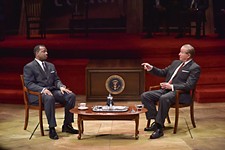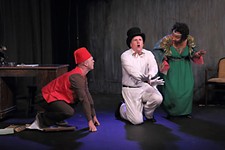The Book of Grace
Tension runs through this lean domestic drama like a taut steel cord
Reviewed by Robert Faires, Fri., June 24, 2011
The Book of Grace
Zach Theatre Whisenhunt Arena Stage, 1510 Toomey, 476-0541
Through July 24
Running time: 2 hr., 10 min.
The time when good fences made good neighbors is long past. Nowadays, a good fence does its job by keeping "them" away from "us" – "them," of course, being different, other, alien. That's how Vet breaks it down anyway, and he feels supremely qualified to render such a judgment: He makes his living at a fence, guarding Texas' border with Mexico, and he's good enough at his job to be receiving an award for it. That honor has prompted his wife, Grace, to invite to their home Vet's son from a prior marriage, in hopes that the visit might ease their strained relationship.
Grace, you see, is a big one for hope. She insists on looking at life's bright side and even collects tales of selflessness and charity – "evidence of good things," she calls them – for a book she hopes to publish. As played by Nadine Mozon in Zach Theatre's staging of The Book of Grace, this optimistic waitress is indeed sunny, her face seemingly unable to resist breaking into a smile that beams, her manner as open as the book in which she files her heartening stories.
In this reunion of her husband and stepson, however, her hopes may be misplaced. Buddy makes references to "unspeakable" acts that his father did to him when he was a boy, and it's clear from both the writing and Shaun Patrick Tubbs' charged, keyed-up performance that what Buddy has in his mind is less reconciliation than retribution. And the old man, for all his talk of change, of being "on the good foot now," is as closed to compassion as his border fence is to foreigners. As Vet, Eugene Lee appears chiseled from stone, the only crack in his impervious exterior around his eyes, which are narrowed in a near perpetual squint, regarding with suspicion whoever he sees – including his own flesh and the woman to whom he's wed.
As playwright, Suzan-Lori Parks has laid out the conflicts among this trio with such economy and clarity that they run like a taut steel cord throughout the play; it's as lean and direct a drama as she's written. And as director, she infuses this production with a heightened level of tension that never lets up. But while the narrative is straightforward, that doesn't mean it's simple. Parks has layered into it familiar images and issues from her other works: allusions to history, a hole that is both a grave and an erasure of the past, the slippery question of identity. In his pursuit of vengeance, Buddy renames himself Snake – a name his father once went by, which suggests not only that mythic trope of the son killing the father but also a man becoming the thing that he hates.
That human cost of our actions – not just to Buddy but to Grace and Vet as well – is where Parks' interest lies, not in hashing over current issues of immigration, despite her setting. And yet The Book of Grace is not wholly without a political dimension. When Buddy quotes at length from the Declaration of Independence and the Constitution, the questions of what constitutes tyranny and betrayal and how one strikes back against them expand beyond the personal into our civic life. We can also glimpse in this family's struggles the futility and even tragedy when adversaries become too rigid in their opposition and demonize one another. In Vet's unyielding division of the world into "us" and "them," his relentless rejection of the other, lies a cautionary tale: Keep following that road, and you eventually end up where everyone else is "them" and there is no "us," just you. That, Parks reminds us powerfully here, is the danger of barriers, whether they're at a border fence or around one's heart. So there may yet be a truth for us in Robert Frost's old poem: "Something there is that doesn't love a wall/That wants it down."











